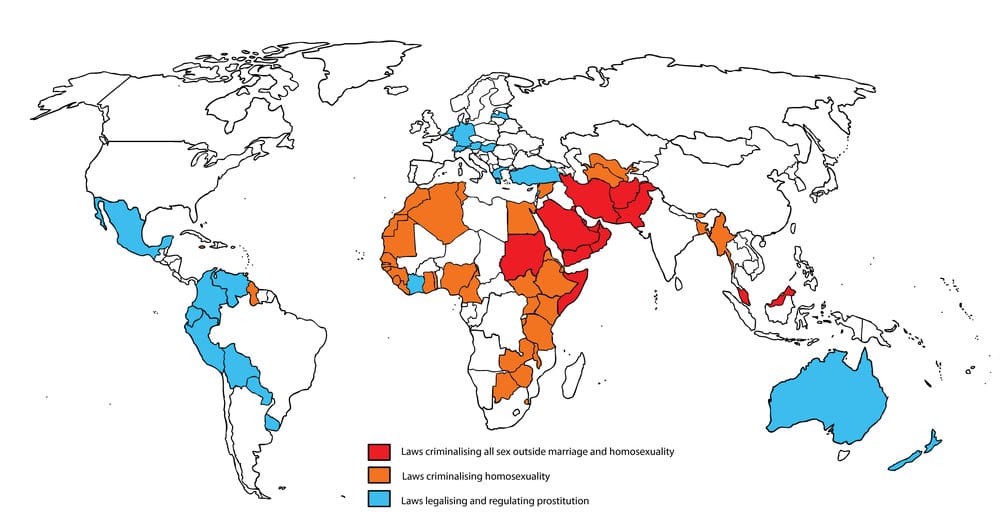Freedom to Fornicate
Imperial is an orgy by international standards

This week, Felix releases the full results of the much-anticipated sex survey. This typically makes for depressing reading in a university concerned with its high levels of “geekiness” and obsessed with a less than ideal gender ratio. Beyond the statistics and the innuendo, there is, however, a hidden and, I believe, largely positive message of how far British society has come, holding such a survey would have been unthinkable when Felix was founded. While the survey has only been run for two years, is still highly anonymous, filled with “I’d prefer not to say” and is taboo discussion outside the student world, it reflects a freedom that still does not exist in many countries. This week, we look at the sexual rights that we take for granted but continue to be restricted around the world.
Fornication
80% of Imperial students are not virgins, yet very few students are married. Other than during a brief Puritan period (1650-1660), this has largely been legal (though often scandalous or taboo) in England. However, the act is forbidden under Islamic law (Zina) and is illegal in at least twelve Muslim countries.
Homosexuality
It has been 45 years since homosexuality was decriminalised, and only 8 years since civil partnerships were introduced, but 14% of students described themselves as either bisexual or homosexual. Homosexuality is legal in much of the world, and marriage legislation has been passed in much of Europe and the mainland of the Americas. In 2009, the Indian Supreme Court finally deemed old anti-homosexual colonial legislation as unconstitutional, freeing a further one-fifth of the world’s homosexual population. It may seem progress is being made, but the reality is homosexual acts remain illegal in much of the Middle East, Africa and the Caribbean. In many (largely Muslim) countries, homosexuals are executed. In much of Africa, things are moving backwards. In Uganda, an anti-homosexual bill has re-emerged, though with the odious death penalty for repeat “offenders” removed after international pressure, as MPs continued to describe homosexuality as “un-African” and “un-Christian”.
Abortion
55% of students admitted to having sex without any method of contraception. While most will be able to look back at this as a stupid mistake with no real consequences, in much of the world it could change your life completely. While abortions can legally take place in almost every country on Earth, in most of Africa, South America, the Middle East and the Far East, making a stupid drunken mistake is not a valid excuse. In fact, rape is often not considered a valid reason – abortions are typically only legal if the mother’s health is at risk.
Prostitution
Okay, I can’t give any Imperial statistic for this one – I would hope the college degree has a good enough reputation that no student would ever have to turn to selling their body. However, the law is nevertheless important. The “oldest profession in the world” is illegal in much of Africa, Asia (notable examples include India and Kazakhstan) and the United States (though not Nevada). In a small number of countries (see above) it is regulated and legal, but in most countries (including the United Kingdom) laws exist against brothels and pimping. The exchange of sex for money is not, however, a criminal offence.
Religion, the Law & the Fact
It should be noted that these laws often fail to reflect the reality on the ground. Homosexuals are often attacked and even killed without any concern from authorities in countries where it has been decriminalised. Abortions and prostitution are widespread in all countries. The difference is that in areas where they are illegal, abortions are often very dangerous and prostitutes may be attacked without protection from the authorities – a particular problem in Pakistan where fornication, homosexuality and prostitution are illegal yet eunuch brothels are commonplace.
However, while the United Kingdom may have made progress in these areas, this does not make us “free”. Islamic countries, for instance, often allow polygamy (though, importantly, only with one man), while British law still only gives advantages (in the form of tax breaks) to pairs of people who make a long term commitment in the form of marriage or civil partnership. Further, “pimps” as legal employers would have the duty to protect prostitutes – a single woman working alone is at far greater risk of being harmed.









